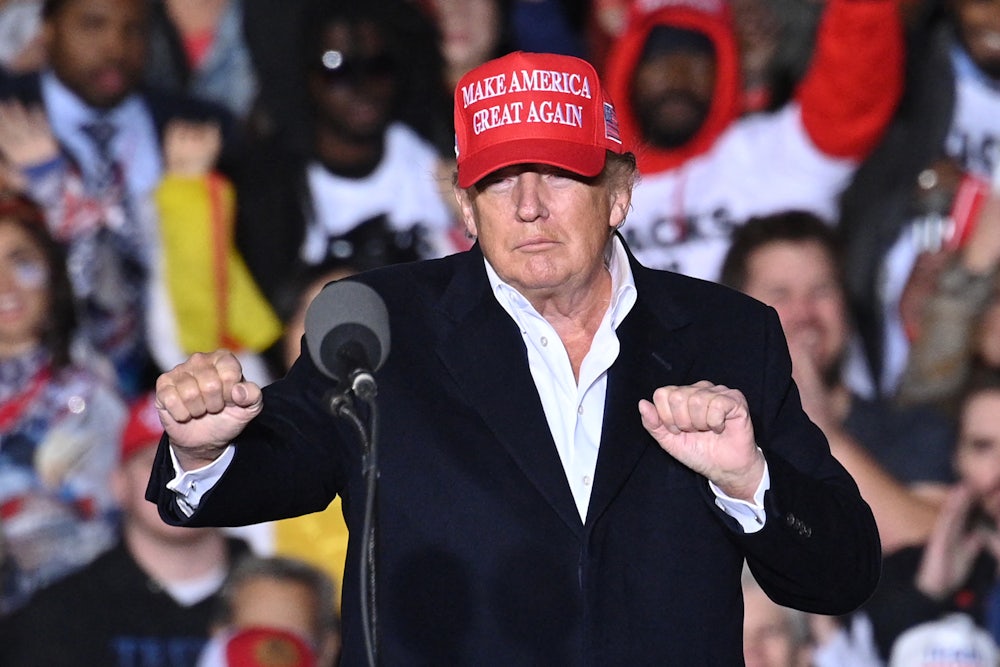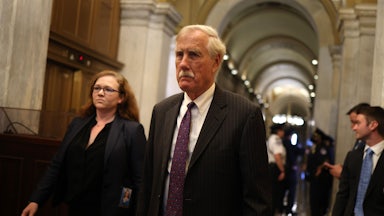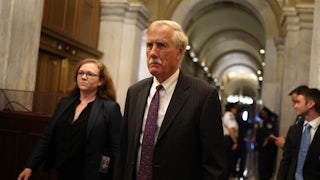One of the great ironies of the January 6 commission tasked with investigating the Capitol riot and the forces behind it is that while it’s a necessary endeavor—for both an accurate historical record and to enforce accountability—it’s hardly needed in a psychic sense. We all know that President Trump wanted to overturn the election and that he fomented an attack in service of those desires.
What’s more, Trump keeps spoiling the ending of the story by continually confessing to the very improprieties that the commission is attempting to root out—and he keeps promising to do more such acts in the future. As Shane Goldmacher chronicled for The New York Times this week, Trump’s recent rally appearances “have stripped away any pretense that the events of Jan. 6, 2021, were anything but the culmination of the former president’s single-minded pursuit of retaining power.”
Trump said straightforwardly that he wanted Vice President Mike Pence to overturn the election, thus, as Goldmacher points out, “acknowledging for the first time that the aim of the pressure campaign he focused on his vice president had simply been to change the election’s result, not just to buy time to root out supposed fraud, as he had long insisted.” Trump also pledged to pardon the January 6 insurrectionists if he came back to power, a promise that The Daily Beast’s Matt Lewis referred to as “worse than Watergate”—as if that boundary hadn’t already been breached several times over.
But recent reports suggest that there’s a lot left to learn about Trump’s plot to overturn the election and the cretins who tried to enable it. The latest bombshell was another Times report detailing Trump’s attempts to find a government agency willing to seize voting machines in swing states, a plot debated among a cabal of advisers within the Big Lie Extended Universe, including “kraken” attorney Sidney Powell, retired Army Col. Phil Waldron (who’s recently emerged as an object of media fascination), Gen. Michael Flynn, Masked Singer competitor Rudy Giuliani, and Giuliani associate Bernard Kerik. The latter two, according to the Times, were “often … at odds” with Trump, but lest you think too highly of them, remember that they didn’t immediately rat Trump out—a move that might have forestalled the events of January 6.
In Washington, lawmakers on both sides of the aisle are coalescing around reforming the Electoral Count Act, the obscure and poorly written law that governs how electoral votes are counted, with an eye toward protecting the next presidential election from Trump and his brigade of dead-enders. As The Washington Post’s Greg Sargent notes, Trump is hopping mad over this. He’s also “making the case for ECA reform as powerfully as anyone could want,” by “telegraphing with absolute clarity his intention to rerun his effort in 2024 if the conditions are there for it.”
But there may yet be a flaw in reformers’ designs. House Democrats are pushing to make it harder for members of Congress to reject any slates of electors provided by state governors by requiring a two-thirds supermajority, rather than a simple majority, in both the House and Senate. Had this been in place in 2020, much of the drama that ensued among lawmakers during the certification process would have been avoided.
However, as Judd Legum points out in a recent edition of Popular Information, Democrats may not be thinking ahead. The next crisis may not come from challenges to legitimate slates of electors. Citing a new paper from Yale Law’s Matthew Seligman, Legum warns that a future Congress may have to deal with “a Trump-supporting Republican Governor in a swing state ignoring the results and submitting a phony certification to Congress.”
In this scenario, a supermajority built to protect the integrity of the election becomes the means by which the plot to overturn the election is furthered. As Insider’s Grace Panetta has written, Georgia gubernatorial candidate David Purdue is one governor who might consider carrying out such a plot; Legum points to Republicans running for statehouses in Michigan, Pennsylvania, and Wisconsin who also fit the bill.
All of which goes to show that no matter how exposed Trump’s band of miscreants might be, the former president is still adding powerful allies to his corrupt cause. And the next coup, if it comes, will look very different from the last one. It won’t be a ragtag mob trying to sack the Capitol or flailing efforts to enlist the Department of Homeland Security to swipe voting machines off the streets. Strong protections were already in place before Trump took those desperate measures. Rather, the next plot against the Republic would be much more subtle, painted with a sheen of lawfulness and mounted against more vulnerable spots, where democracy is held together only by long-standing norms and gentlemen’s agreements. But what happens when those gentlemen are replaced by rogues?










